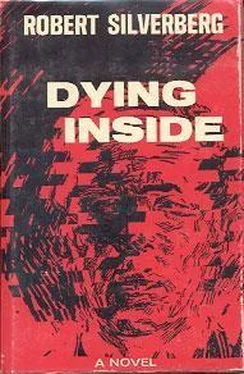Early in November Nyquist gave one of his occasional dinner parties, catered by a Chinatown restaurant he favored. His parties were always brilliant events; to refuse the invitation would have been absurd. So at last I would have to expose you to him. For more than three months I had been more or less deliberately concealing you from him, avoiding the moment of confrontation, out of a cowardice I didn’t fully understand. We came late: you were slow getting ready. The party was well under way, fifteen or eighteen people, many of them celebrities, although not to you, for what did you know of poets, composers, novelists? I introduced you to Nyquist. He smiled and murmured a sleek compliment and gave you a bland, impersonal kiss. You seemed shy, almost afraid of him, of his confidence and smoothness. After a moment of patter he went spinning away to answer the doorbell. A little later, as we were handed our first drinks, I planted a thought for him:
— Well? What do you think of her.
But he was too busy with his other guests to probe me, and didn’t pick up on my question. I had to seek my own answers in his skull. I inserted myself—he glanced at me across the room, realizing what I was doing—and rummaged for information. Layers of hostly trivia masked his surface levels; he was simultaneously offering drinks, steering a conversation, signaling for the eggrolls to be brought from the kitchen; and inwardly going over the guest list to see who was yet to arrive. But I cut swiftly through that stuff and in a moment found his locus of Kitty-thoughts. At once I acquired the knowledge I wanted and dreaded. He could read you. Yes. To him you were as transparent as anyone else. Only to me were you opaque, for reasons none of us knew. Nyquist had instantly penetrated you, had assessed you, had formed his judgment of you, there for me to examine: he saw you as awkward, immature, naive, but yet also attractive and charming. (That’s how he really saw you. I’m not trying, for ulterior reasons of my own, to make him seem more critical of you than he really was. You were very young, you were unsophisticated, and he saw that.) The discovery numbed me. Jealousy curdled me. That I should work so ponderously for so many weeks to reach you, getting nowhere, and he could knife so easily to your depths, Kitty! I was instantly suspicious. Nyquist and his malicious games: was this yet one more? Could he read you? How could I be sure he hadn’t planted a fiction for me? He picked up on that:
— You don’t trust me? Of course I’m reading her.
— Maybe yes, maybe no.
— Do you want me to prove it?
— How?
— Watch.
Without interrupting for a moment his role of host, he entered your mind, while mine remained locked on his. And so, through him, I had my first and only glimpse of your inwardness, Kitty, reflected by way of Tom Nyquist. Oh! It was no glimpse I ever wanted. I saw myself through your eyes through his mind. Physically I looked, if anything, better than I imagined I would, my shoulders broader than they really are, my face leaner, the features more regular. No doubt that you responded to my body. But the emotional associations! You saw me as stern father, as grim schoolmaster, as grumbling tyrant. Read this, read that, improve your mind, girl! Study hard to be worthy of me! Oh! Oh! And that flaming core of resentment over our ESP experiments: worse than useless to you, a monumental bore, an excursion into insanity, a wearying, grinding drag. Night after night to be bugged by monomaniacal me. Even our screwing invaded by the foolish quest for mind-to-mind contact. How sick you were of me, Kitty! How monstrously dull you thought me!
An instant of such revelation was more than enough. Stung, I retreated, pulling away quickly from Nyquist. You looked at me in a startled way, I recall, as if you knew on some subliminal level that mental energies were flashing around the room, revealing the privacies of your soul. You blinked and your cheeks reddened and you took a hasty diving gulp of your drink. Nyquist shot me a sardonic smile. I couldn’t meet his eyes. But even then I resisted what he had showed me. Had I not seen odd refraction effects before in such relays? Should I not mistrust the accuracy of his picture of your image of me? Was he not shading and coloring it? Introducing sly distortions and magnifications? Did I truly bug you all that much, Kitty, or was he not playfully exaggerating mild annoyance into vivid distaste? I chose not to believe I bored you quite so much. We tend to interpret events according to the way we prefer to see them. But I vowed to go easier on you in the future.
Later, after we had eaten, I saw you talking animatedly to Nyquist at the far side of the room. You were flirtatious and giddy, as you had been with me that first day at the brokerage office. I imagined you were discussing me and not being complimentary. I tried to pick up the conversation by way of Nyquist, but at my first tentative probe he glared at me.
— Get out of my head, will you?
I obeyed. I heard your laughter, too loud, rising above the hum of conversation. I drifted off to talk to a lithe little Japanese sculptress whose flat tawny chest sprouted untemptingly from a low-cut black sheath, and found her thinking, in French, that she would like me to ask her to go home with me. But I went home with you, Kitty, sitting sullen and graceless beside you on the empty subway train, and when I asked you what you and Nyquist had been discussing you said, “Oh, we were just kidding around. Just having a little fun.”
* * *
About two weeks later, on a clear crisp autumn afternoon, President Kennedy was shot in Dallas. The stock market closed early after a calamitous slide and Martinson shut the office down, turning me out, dazed, into the street. I couldn’t easily accept the reality of the progression of events. Someone shot at the President. . . . Someone shot the President. . . . Someone shot the President in the head. . . . The President has been critically wounded. . . . The President has been rushed to Parkland Hospital. . . . The President has received the last rites. . . . The President is dead. I was never a particularly political person, but this rupture of the commonwealth devastated me. Kennedy was the only presidential candidate I ever voted for who won, and they killed him: the story of my life in one compressed bloody parable. And now there would be a President Johnson. Could I adapt? I cling to zones of stability. When I was 10 years old and Roosevelt died, Roosevelt who had been President all my life, I tested the unfamiliar syllables of President Truman on my tongue and rejected them at once, telling myself that I would call him President Roosevelt too, for that was what I was accustomed to calling the President.
That November afternoon I picked up emanations of fear on all sides as I walked fearfully home. Paranoia was general everywhere. People sidled warily, one shoulder in front of the other, ready to bolt. Pale female faces peered between parted curtains in the windows of the towering apartment houses, high above the silent streets. The drivers of cars looked in all directions at intersections, as if expecting the tanks of the storm troopers to come rumbling down Broadway. (At this time of day it was generally believed that the assassination was the first blow in a right-wing putsch.) No one lingered in the open; everyone hurried toward shelter. Anything might happen now. Packs of wolves might burst out of Riverside Drive. Maddened patriots might launch a pogrom. From my apartment—door bolted, windows locked—I tried to phone you at the computer center, thinking you might somehow not have heard the news, or perhaps I just wanted to hear your voice in this traumatic time. The telephone lines were choked. I gave up the attempt after twenty minutes. Then, wandering aimlessly from bedroom to livingroom and back, clutching my transistor, twisting the dial trying to find the one radio station whose newscaster would tell me that he was still alive after all, I detoured into the kitchen and found your note on the table, telling me that you were leaving, that you couldn’t stay with me any more. The note was dated 10:30 A.M., before the assassination, in another era. I rushed to the bedroom closet and saw what I had not seen before, that your things were gone. When women leave me, Kitty, they leave suddenly and stealthily, giving no warning.
Читать дальше












